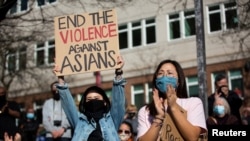In Brooklyn, New York, a white man catcalled an Asian American woman and aggressively followed her down the block, yelling a racial obscenity and a sexually derogatory term.
In Washington, D.C., a man punched an Asian woman in the back in a Metro subway station, repeatedly shouting racial expletives and physically threatening her and her boyfriend.
In Las Vegas, a ride-sharing service driver told his Asian passenger, "Damn, another Asian riding with me today. I hope you don't have any COVID."
The three incidents are among nearly 3,800 firsthand accounts of anti-Asian hate and abuse an advocacy coalition has recorded since the start of the COVID-19 pandemic a year ago. The disease originated in China.
In a new report released Tuesday, Stop AAPI Hate said it recorded 3,795 anti-Asian hate incidents between March 19, 2020 – shortly after COVID-19 was declared a pandemic – and February 28, 2021. More than 500 of the incidents were recorded in 2021.
"The number of hate incidents reported to our center represent only a fraction of the number of hate incidents that actually occur, but it does show how vulnerable Asian Americans are to discrimination," the group said in a statement.
Verbal harassment and shunning made up 68.1% and 20.5% of the incidents, respectively. Physical assaults constituted 11.1% of the total incidents.
Stop AAPI Hate was launched a year ago by a coalition of two Asian American advocacy groups and a university department to help Asian Americans report hate incidents during the pandemic.
Asian Americans started reporting an increase in discrimination as early as January 2020. But the number surged as former President Donald Trump began using xenophobic language such as "kung flu" to refer to the coronavirus and blaming China for the pandemic, Stop AAPI Hate co-founder Cynthia Choi said.
The majority of the incidents recorded by Stop AAPI Hate are not hate crimes, which the FBI defines as criminal offenses motivated by race, religion, sexual orientation and other factors, Choi said.
However, as VOA previously reported, anti-Asian hate crimes last year soared by 150% in major U.S. cities, and the violence has continued into this year.
In January, Vichar Ratanapakdee, an 84-year-old immigrant from Thailand, died after being knocked to the ground in his San Francisco neighborhood. A suspect was later arrested and charged with murder.
The administration of President Joe Biden has taken a stand against the hate epidemic, with Biden issuing a memorandum in January condemning the surge in anti-Asian hate crimes.
Choi said that while Asian American rights organizations welcomed the largely symbolic gesture, they want to see it matched by action.
While the incidents reported to Stop AAPI Hate took place in all 50 states and the District of Columbia, California — the state with the largest Asian American population — accounted for 45% of the incidents. New York, home to the second largest Asian community, accounted for 14%.
Chinese Americans were the most frequently targeted group, reporting 42.2% of the incidents, followed by Koreans, 14.8%; Vietnamese, 8.5%; and Filipinos, 7.9%, according to the report. Women were more than twice as likely as men to report incidents.
The woman attacked in the Washington Metro station told Stop AAPI Hate that the incident took place on an escalator at a transfer station.
"A few days later, we saw a news story about how the owner of Valley Brook Tea in D.C. was harassed and pepper-sprayed by the same man, calling him 'COVID-19' repeatedly," the woman reported.
No arrest was made in the case. The Metropolitan Police Department closed the case after the U.S. Attorney's office declined to bring charges, according to an MPD spokeswoman.
In response to the surge in anti-Asian violence, the Justice Department said last month that since the start of the Biden administration, it has trained hundreds of federal prosecutors and law enforcement officers to identify, investigate and prosecute hate crimes and other civil rights crimes.
"I want to be clear here: No one in America should fear violence because of who they are or what they believe," acting Deputy Attorney General John Carlin said during a press call last month.





